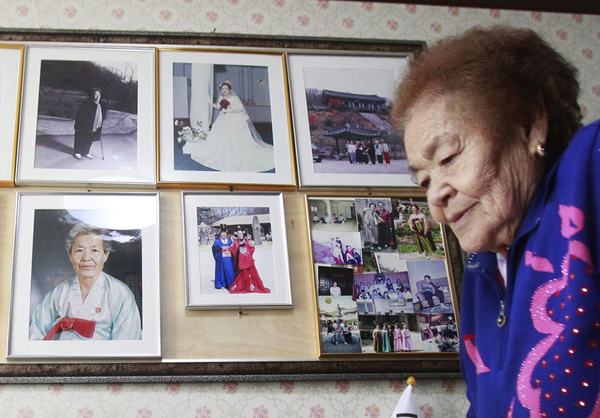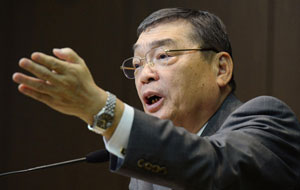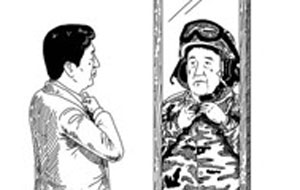|

In this Feb. 3. 2014, Kim Gun-ja, 89, former comfort woman who was forced to serve for the Japanese troops as a sex slave during World War II, passes by her wedding picture, top center, at the House of Sharing, a nursing home and museum for 10 former sex slaves, in Toechon, South Korea. [Photo/icpress.cn]
|
TOKYO - Japan's top government spokesman said Thursday that Tokyo would consider re-examining a 20-year-old study that led to a landmark apology over its forced prostitution in World War II.
Chief Cabinet Secretary Yoshihide Suga was responding to an ultra-conservative opposition lawmaker who said there was no such thing as sex slavery - an emotional issue for women wartime victims across Asia.
Suga said that Japan would consider verifying the authenticity of the interviews with 16 South Korean women who said they were forced to serve as prostitutes for Japan's wartime military.
The remark underscores the longstanding revisionist views and doubts over the victims' accounts, and would certainly further escalate already strained relations between Japan and South Korea.
The interviews were conducted by Japanese government officials in Seoul at the request of South Korea's government and were key to Japan's 1993 statement and apology later that year.
The statement, issued by then-Chief Cabinet Secretary Yohei Kono, acknowledged many women were forced into prostitution for Japan's wartime military despite the lack of records clearly showing the Japanese government's systematic involvement.
Prime Minister Shinzo Abe has been criticized by South Korea and China for backpedaling from Tokyo's apologies and past acknowledgement over its wartime atrocities. Members of his nationalist government have been increasingly frustrated by South Korea's recent efforts to enlist the support of the United States for Washington to put pressure on its ally, Japan, to stick to its 1993 apology.
Although numbers vary, some historians say as many as 200,000 women from across Asia, most of them Koreans, were forced to serve as sex slaves to Japanese soldiers at front-line brothels.


